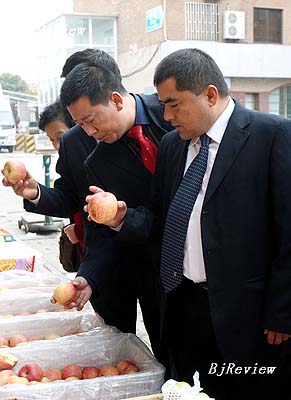|

Raised Fines for Water Polluters
A draft amendment to the Water Pollution Prevention and Control Law, which was deliberated by the weeklong 31st Session of the Standing Committee of the National People's Congress (NPC), China's top legislature, significantly raises fines for enterprises failing to fulfill pollution control duties.
It lifts the ceiling of fines for enterprises blamed for discharging pollutants surpassing the set standard.Fines for such businesses could vary from two to five times the pollutant discharging fees they should pay according to the severity of the violation. Enterprises that fail to rectify the situation within a fixed time period would be closed.
Defending Open-Ended Contracts
The NPC had tried to dismiss popular worries that the introduction of no-fixed-term contracts in the new Labor Contract Law, which was brought into effect on January 1, 2008, might exert heavy burdens on employers and reduce corporate efficiency.
The new law requires Chinese employers to sign no-fixed-term contracts with their employees if the employees have worked for them for more than 10 consecutive years, or the two sides have signed fixed-term contracts twice.
"No-fixed-term contract does not mean a lifelong job and the new law has granted employers the right to fire employees with no-fixed-term contracts if the employees violate laws or are no longer capable of doing the job," Zhang Shicheng, an official with the NPC's Standing Committee, told Xinhua.
Curbing Trafficking of Women and Children
China has released an anti-trafficking plan for curbing the trade in women and children over the next five years.
The plan for the period between 2008 and 2012 set a general objective to minimize crimes of trading in women and children and to minimize the physical and psychological pain they suffer.
According to the first national plan of its kind, a ministerial-level joint committee headed by the Ministry of Public Security will be established and local regions, especially where trafficking cases frequently occur, should set up relevant organs. The committee will involve 28 government ministries, which will make a concerted effort to halt trafficking crimes, the plan said.
Hong Kong's Anti-Spam Law
The Unsolicited Electronic Messages Ordinance was fully implemented on December 22, 2007, in Hong Kong.
People who want to decline unsolicited commercial electronic messages, also known as spam, can register their phone or fax numbers onto three do-not-call registers, which will be launched by January 25. Protection will start from the 10th working day from the registration date.
Commercial electronic message senders are reminded to: provide accurate sender information and an unsubscribe facility in a message; honor recipients' unsubscribe requests; not to send messages to any phone or fax numbers listed on a do-not-call register unless consent has been obtained from the recipient; not to withhold calling line identification information when sending pre-recorded telephone calls and fax messages; and not to use misleading subject headings when sending email messages.
Auto-Inspired Songwriting
After a six-month songwriting competition organized by Tianjin FAW Toyota Motor Co. Ltd. and Huayi Brothers Music, China's first car music album, including five winning songs, was released in December 2007 to promote the latest Toyota Corolla model in China.
The competition kicked off last June in Beijing and was carried out on the Internet. More than 200 songs were submitted to a designated website. The five winning songs were recorded and made into a CD by Huayi Brothers Music.
This is China's first car music album by a single auto brand. The music company only produced 5,000 copies of the album and they are not for sale. Anyone who bought the Toyota Corolla model before New Year could receive the album for free. | 